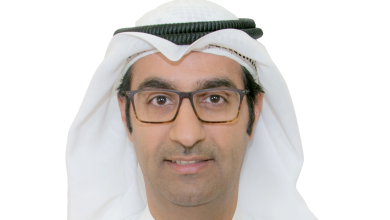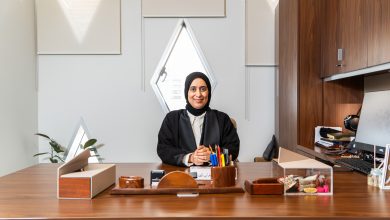The Associate Professor Demystifying Complex Law Topics for the Next Generation

Making complex topics like corporate governance and business law accessible can be a challenge, but doing so in another language is even more difficult. This is precisely what Abdullah Alshebli has achieved, with his contribution to the field now recognized by the prestigious Jaber Al-Ahmad Award for Young Researchers from the Kuwait Foundation for the Advancement of Sciences (KFAS).
“I am extremely honored to receive this award. It is great recognition for the work I have done, and it makes me feel very proud of what I have achieved,” Alshebli said upon receiving the award in the social and human sciences category.
Alshebli found out about the Jaber Al-Ahmad Award for Young Researchers through chance and decided to submit his work for consideration. Preparing his application took some time, which is understandable once you learn more about his extensive achievements within this field.
حصل الشبلي على بكالوريوس في علوم الشرطة من أكاديمية سعد العبدالله للعلوم الأمنية عام 1999، ثم حصل على البكالوريوس في القانون من جامعة الكويت. تنامى اهتمام الشبلي بقانون الشركات والأعمال خلال دراسته الجامعية، وتحديداً أثناء دراسته لنيل درجة الماجستير في القانون الخاص عام 2008 من جامعة الكويت. وكان موضوع بحثه الرئيسي هنا هو التلاعب في سوق الأوراق المالية في الكويت. بعد حصوله على درجة الماجستير، تابع الشبلي دراسته لنيل درجة الدكتوراه في قانون الأعمال وحوكمة الشركات في جامعة ليدز في المملكة المتحدة، واستكمل دراسته في عام 2015. بعد ذلك، أمضى خمس سنوات في المملكة المتحدة كباحث متفرغ.
Alshebli has worked at the Saad Al-Abdullah Academy for Security Sciences in a variety of roles, initially as an Adjunct Lecturer and then as an Adjunct Professor, before taking on his current role of Associate Professor in the law department of the academy. His work here involves developing the curriculum for students, alongside adding to the body of knowledge available for them to study.
Alongside his roles at the academy, Alshebli has experience as a visiting professor at Duke University in the United States, as an adjunct professor at the Gulf University for Science and Technology in Kuwait, and as a visiting researcher at the University of Sheffield in the United Kingdom.
In recent years, he said his focus has shifted to “the topic of business law, especially corporate governance.” He possesses deep knowledge of business law in the UK, USA, and Gulf Cooperation Council (GCC) countries, including Kuwait, and uses that expertise to evaluate how different countries approach the subject.
He has presented papers at a range of international conferences, most recently at the Sixth International Conference on Advances in Business and Law, held at the University of Dubai in the United Arab Emirates. He also has an extensive publication record, with over 15 scientific papers in referred journals and six books.
These have covered a wide range of topics, from legal frameworks for corporate governance to the development of the stock exchange in Kuwait, business and securities law, and the challenges of enforcing corporate governance, to name just a few. Clearly an expert on many areas of complex law, Alshebli also has the ability to demystify these topics for readers, including students entering the field of international law.
Last year, Alshebli released his latest book, Comparative Securities Law: Perspectives from Kuwait, the UK, and US, which he described as one of his “proudest achievements.” Published by the prestigious Routledge group, the book is written in English and provides valuable insights into securities laws and their application in different countries.
Achieving publication was a significant moment in Alshebli’s career, though not without its challenges. “It is the first book published overseas about Kuwaiti law,” he said, a unique achievement given the complexities of translation. “For me, the biggest challenge has been the language mix between English and Arabic and how to swap their grammar,” Alshebli explained. “Most of my research has had to be done in English, which can demand a lot of time and energy. Translating and explaining complex legal terms in another language has not always been easy.”
Despite the extra effort, Alshebli said he is “extremely proud” to have overcome this particular challenge. “It has been very satisfying to write and publish several books and articles, leading to an award like this one.”
Alshebli also acknowledges the impact his family and colleagues have had on his career: “I would like to thank my family for their continued support, as well as my colleagues who have assisted me in my work. In addition, I must thank my country for the opportunities it has afforded me, and KFAS for giving me the chance to apply for this award.”
Balancing work and personal life is another challenge Alshebli has faced. “Like many researchers, time management is never easy. However, I feel that I am reaping the rewards of my hard work now, and I’ve been able to strike a balance between my work and family life,” he said.
Continuing his work, Alshebli is completing the manuscript for another book, also written in English, covering perspectives on the legal systems in Kuwait, the UK, and the US. His next challenge is finding a publisher for this unique work. “There haven’t been many books written about the Kuwaiti legal system in English,” he said. “I hope the book will be published soon and help many people learn about the subject.”
By Emma Stenhouse




